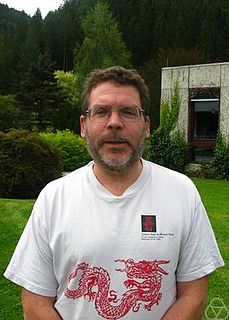A Quote by Ronald Graham
Incidentally, when we're faced with a "prove or disprove," we're usually better off trying first to disprove with a counterexample, for two reasons: A disproof is potentially easier (we need just one counterexample); and nitpicking arouses our creative juices. Even if the given assertion is true, our search for a counterexample often leads to a proof, as soon as we see why a counterexample is impossible. Besides, it's healthy to be skeptical.
Related Quotes
Until we fully understand what turned two brothers who allegedly perpetrated the Boston Marathon bombings into murderers, it is hard to make any policy recommendation other than this: We need to redouble our efforts to make America stronger and healthier so it remains a vibrant counterexample to whatever bigoted ideology may have gripped these young men....And the best place to start is with a carbon tax.
However the machine would permit us to test the hypothesis for any special value of n. We could carry out such tests for a sequence of consecutive values n=2,3,.. up to, say, n=100. If the result of at least one test were negative, the hypothesis would prove to be false; otherwise our confidence in the hypothesis would increase, and we should feel encouraged to attempt establishing the hypothesis, instead of trying to construct a counterexample.
The Consequentialist trinity is typically regarded in this way: Bentham is crude, Mill's writings are full of howlers and inconsistencies, and Sidgwick was too smart to fully embrace Consequentialism. All of these great traditions in moral philosophy express strands of our moral consciousness and they should all be treated as research programs rather than as fully determinate views that can be leveled by a counterexample or by a clever argument.
If one were to claim that the U.S. occupation forces in Iraq have been provided with "keys to heaven" by the Pentagon, would that need historical research to be disproved or would you just say, "That's just propaganda"? Indeed, how can you disprove the claim that U.S. soldiers have such keys? Or why should you disprove such ridiculous claims? It is the accusers who must provide the evidence.
It is often said that education and training are the keys to the future. They are, but a key can be turned in two directions. Turn it one way and you lock resources away, even from those they belong to. Turn it the other way and you release resources and give people back to themselves. To realize our true creative potential-in our organizations, in our schools and in our communities-we need to think differently about ourselves and to act differently towards each other. We must learn to be creative.






































